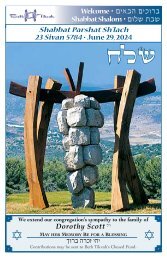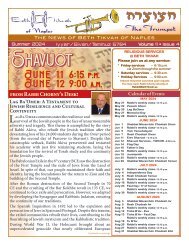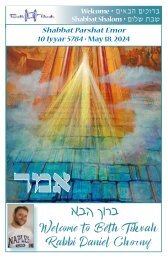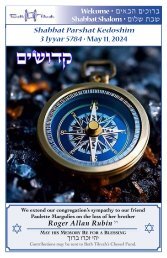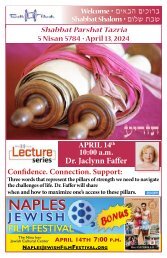Bulletin Nitzavim
Create successful ePaper yourself
Turn your PDF publications into a flip-book with our unique Google optimized e-Paper software.
Shabbat <strong>Nitzavim</strong>/Vayelech<br />
23 Elul 5783 • September 9, 2023<br />
Welcome • ohtcv ohfurc<br />
Shabbat Shalom • ouka ,ca<br />
lkhu ohumb<br />
בחיים<br />
ובחרתם<br />
Monday, September 25 | 7:30 p.m. After Nehila<br />
RSVP by September 21 | Cost $25 p/p
Yahrtzeiten<br />
120 sg<br />
vfrck oburfz<br />
Sep 8 • 22 Elul Esther Gilbert – Mother of Howard Gilbert<br />
Sep 9 • 23 Elul David Gelb – Father of Terri Kline<br />
Sep 11 • 25 Elul Claude McKenzie – Father of Marles Frankman<br />
Gussie Ponter – Grandmother of Alan Rosenberg<br />
Mary Weiss – Mother of Sue Brown<br />
Sep 12 • 26 Elul Kalman Forman – Father-in-law of Melvin Goldfine<br />
Sep 14 • 28 Elul Irma Heller – Mother of Ellaine Rosen<br />
Birthdays<br />
Sep 9<br />
Sep 10<br />
Sep 13<br />
Sep 15<br />
Anniversaries<br />
Stuart Cohen<br />
Steven Chizzik<br />
Jack Brown<br />
Norma Rosen, Ray Fant<br />
Sep 8 Shelly & Bob Goodman (57)<br />
Sep 10 Susan & Mark Wasserman (45)<br />
Sep 15 Leona & Herbert Wreschner (51)<br />
Shabbat Kiddush Sponsored<br />
by:<br />
Susan & Mark Wasserman<br />
In honor of their 45 th Anniversary<br />
Terri & Stuart Kline<br />
In memory of Terri’s father David Gelb<br />
Beth Tikvah<br />
Welcomes Cantor & Mrs. Norman Brody<br />
jna `skuv ouh<br />
cuy kzn<br />
Maven: Rosalee Bogo<br />
Assisted by: Steve Chizzik, Joe & Sue Hammerman, Lee Henson,<br />
Linda & Shep Scheinberg & Sue Wasserman<br />
k ” z<br />
Sponsor a Kiddush<br />
Contact Arleen Sivakoff: 239.455.8811 • dsivakoff@aol.com
Torah & Haftarah Readings:<br />
Shabbat <strong>Nitzavim</strong> /Vayelech: 29:9 - 30:14 (Etz Hayim p. 1165)<br />
1. 29:9-11 2. 29:12-14 3. 29:15-28 4. 30:1-3<br />
5. 30:4-6 6. 30:7-10 7. 30:11-14 M. 31:28-30 (p. 1178)<br />
Haftarah: Isaiah 61:10-63:9 (p. 1180)<br />
Torah Commentary<br />
D’var Torah:<br />
The Moist and the Parched - Bex Stern-Rosenblatt<br />
Standing here, on the edge of the coming holidays and on the edge of Canaan, we look forward<br />
towards water. On Shemini Atzeret, we will begin to recite “who brings down the rain”<br />
in the Amidah, welcoming rain back into our lives also with the beautiful Tefillat HaGeshem.<br />
Looking out towards the Jordan in Deuteronomy, we reimagine our relationship with God<br />
using rain as both metaphor and reality.<br />
As we enter a land where we will become farmers, our water needs will change dramatically. In<br />
order to receive the water we need to survive, we will need to recognize constantly that God is<br />
the source of all water. This land is “a goodly land, a land of brooks of water, springs<br />
and deeps coming out in valley and in mountain,” as opposed to our forty years in “the<br />
great and terrible wilderness… where there is no water” in which God has had to bring “water<br />
out for you from flintstone.” Unlike Egypt, in this land “from the rain of the heavens<br />
you will drink water.” That rain is, of course, contingent on heeding God’s commandments,<br />
“to love the LORD your God and to worship Him with all your heart and with<br />
all your being.” The Book of Genesis was replete with famine in Canaan, where lack of water<br />
may have caused mass starvation. Now that we are back in that land, God has given us the key<br />
to avoiding starvation, to avoiding having to leave the land in search of food. We just have to<br />
follow the commandments and God will grant us water and God will be to us as water.<br />
This idea of God, goodness, and life itself as water is deepened in our parshah. We read of the<br />
secret sinner: “Should there be among you a man or a woman or a clan or a tribe whose heart<br />
turns away today from the LORD our God to go worship the gods of those nations, should<br />
there be among you a root bearing fruit of hemlock and wormwood, it shall be, when he hears<br />
the words of this oath and deems himself blessed in his heart, saying, ‘It will be well with me,<br />
though I go in my heart’s obduracy’ in order to sweep away the moist with the parched, the<br />
LORD shall not want to forgive him, for then shall the LORD’s wrath and His jealousy smolder<br />
against that man, and all the oath that is written in this book shall come down upon him, and<br />
the LORD shall wipe out his name from under the heavens.”<br />
This passage seems to be saying, simply, that God will punish those who worship foreign gods<br />
in secrecy. Indeed, a few verses later we read “things hidden are for the LORD our God and<br />
things revealed for us and for our children forever to do all the words of this teaching.” We<br />
worry about the existence of such secret wrongdoers because from those individuals much<br />
wrongdoing can blossom, infecting the whole nation.<br />
But the phrase “in order to sweep away the moist with the parched” demands to be interpreted.<br />
The word translated here as “sweep” likely comes from the root safah. In the Torah, it appears<br />
only in a few choice places. We meet it first in the story of the destruction of Sodom and<br />
Gomorrah, both when Abraham asks, “Will you really sweep away the innocent with the<br />
guilty?” and also when the visitors urge Lot to get a move on it lest his family “swept away in<br />
the punishment of the city.” It occurs next in the mouth of Moses in response to the request of<br />
the Reubenites and Gaddites to stay on the far side of the Jordan. Moses recounts the story of
the spies, explaining how their wrongdoing led to wandering in the wilderness for forty years,<br />
before concluding that the request of the Reubenites is even worse: “And, look, you have arisen<br />
in your fathers’ stead, a breed of offending men, to add still more of the LORD’s flaring wrath<br />
against Israel.” Here, “to add” is likely from the same root as the word we have been translating as<br />
“sweep.” The final time the word appears in the Torah is in the Song of Moses, as God describes<br />
all the terrible ways God will destroy us - “I will sweep disaster upon them, my arrows I will<br />
finish on them.” The idea of sweeping away in the Torah contains divine collective punishment<br />
for individual crimes. It is only too appropriate that it appears in our context of fear of individual<br />
wrongdoing.<br />
The words “moist” and “parched” are more complicated. Some interpret these words as<br />
representing totality, two opposite ends of a spectrum encompassing everything in between<br />
them. “To sweep away the moist with the parched” becomes then another way of saying “to<br />
sweep away everything and everyone.” In the Deuteronomic scheme of water, the moist are<br />
surely the good, the followers of the commandments, and the parched are those who do not.<br />
The secret sinner is the parched and the community is the moist and God must figure out how to<br />
administer justice. The word translated here as moist is haravah. The precise meaning is unclear.<br />
It comes from ravah, meaning watered, soaked, satiated. Rashi will go so far as to interpret the<br />
meaning as drunk, God will sweep away the drunk with the thirsty or even the sober. The word<br />
translated as “parched” is hatzmeah. This word appears in the stories of great thirst, of need for<br />
water, in our desert wanderings.<br />
Even as we enter the land, we carry those desert wanderings with us. We carry the memory of<br />
the destruction of Sodom and Gomorrah. We carry our entire history, our entire relationship<br />
with God, the entire array of human possibility and human error. The land we are entering is<br />
fundamentally different from anything we have experienced in recent memory. But we are the<br />
same. As we look towards water and look towards God, it is only through our recollections of<br />
lack of water, of drunkenness, of unjust destruction, that we can hope to change ourselves and<br />
our society in a way that will allow for water and goodness to flow.<br />
Rosh HaShanah 5784<br />
First<br />
Night<br />
Friday<br />
September 15<br />
Candle<br />
Lighting<br />
6:00 p.m.<br />
Evening<br />
Service<br />
6:15 p.m.<br />
First<br />
Night<br />
Friday<br />
September 29<br />
Evening<br />
Service<br />
6:15 p.m.<br />
First<br />
Day<br />
Saturday<br />
September 16<br />
Morning<br />
Service<br />
9:00 a.m.<br />
Torah<br />
Service<br />
10:30 a.m.<br />
First<br />
Day<br />
Saturday<br />
September 30<br />
Morning<br />
Service<br />
9:00 a.m.<br />
Second<br />
Day<br />
Sunday<br />
September 17<br />
5784 Morning – 2023-2024<br />
Sukkot<br />
Service<br />
9:00 a.m.<br />
Torah<br />
Service<br />
10:30 a.m.<br />
Simchat<br />
Torah<br />
Friday<br />
October 6<br />
Evening<br />
Service<br />
6:15 p.m.<br />
Yom Kippur<br />
Kol<br />
Nidrei<br />
Sunday<br />
September 24<br />
Candle<br />
Lighting<br />
5:50 p.m.<br />
Evening<br />
Service<br />
6:00 p.m.<br />
Shmini<br />
Atzeret<br />
Saturday<br />
October 7<br />
Morning &<br />
Yizkor Srvc.<br />
9:00 a.m.<br />
Yom Kippur<br />
Day<br />
Monday<br />
September 25<br />
Morning<br />
Service<br />
9:00 a.m.<br />
YIZKOR<br />
Service<br />
11:30 a.m.<br />
Mincha<br />
& Neilah<br />
5:00 p.m.<br />
Break the<br />
Fast<br />
7:30 p.m.<br />
daeh dnizg<br />
Saturday evening September 9 th - 8:00 p.m.






